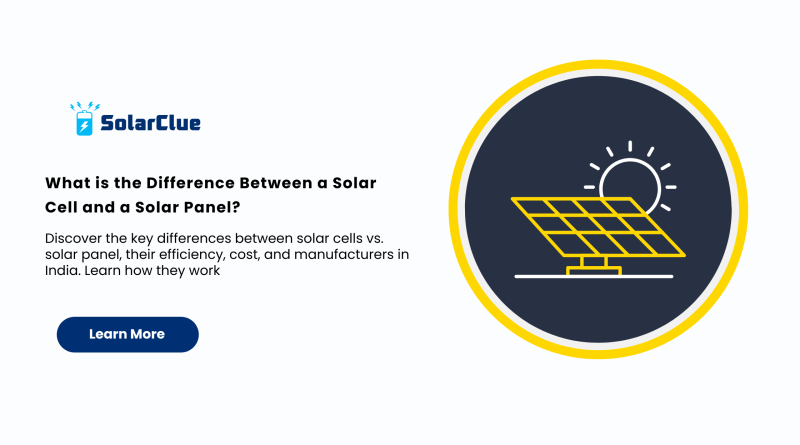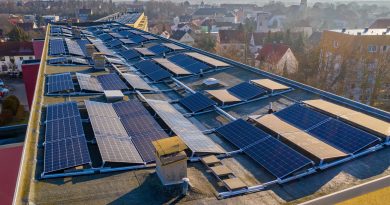Solar Cell vs. Solar Panel: Understanding the Key Differences and Their Roles in Solar Energy
When it comes to harnessing solar energy, many people use the terms solar cells and solar panels interchangeably. However, there is a fundamental difference between the two. While a solar cell is the basic building block that converts sunlight into electricity, a solar panel is a collection of multiple solar cells wired together to generate usable power for homes and businesses. Understanding the distinction between solar cells vs. solar panel is crucial for making informed decisions about solar energy adoption.
Table of Contents
- 1 What is a Solar Cell?
- 2 What is a Solar Panel?
- 3 Key Differences Between Solar Cells vs. Solar Panel
- 4 Which One Should You Choose?
- 5 Frequently Asked Questions (FAQs)
- 5.1 1. What is the difference between solar cell and solar panel?
- 5.2 2. How efficient are solar cells?
- 5.3 3. What is the cost of solar panels in India?
- 5.4 4. Who are the top solar panel manufacturers in India?
- 5.5 5. Are solar cells better than solar panels?
- 5.6 6. Can I buy individual solar cells for DIY projects?
- 6 Conclusion
What is a Solar Cell?
A solar cell is a semiconductor device that directly converts sunlight into electricity through the photovoltaic effect. These tiny units are made primarily from silicon and are responsible for absorbing solar energy and generating electric current.
Types of Solar Cell
There are several types of solar cell available in the market, each with unique properties affecting solar cell efficiency and cost:
1. Monocrystalline Solar Cells – Made from a single crystal structure, these offer the highest efficiency and longevity.
2. Polycrystalline Solar Cells – Composed of multiple silicon fragments, they are more affordable but slightly less efficient than monocrystalline ones.
3. Thin-Film Solar Cells – Flexible and lightweight, these are ideal for portable applications but have lower efficiency.
4. Perovskite Solar Cells – An emerging technology with high potential efficiency but still in the research phase.
Solar Cell Efficiency and Cost
The efficiency of a solar cell determines how much sunlight is converted into electricity. Monocrystalline solar cells offer the highest efficiency, often exceeding 22%, whereas polycrystalline cells typically have efficiencies between 15% and 18%. The solar cell cost varies depending on the type and quality of the material used. Generally, monocrystalline solar cells are the most expensive, followed by polycrystalline and thin-film options.
Top Solar Cell Manufacturers in India
India has a growing solar industry with several leading solar cell manufacturers in India:
1. Tata Power Solar
2. Vikram Solar
3. Waaree Energies
4. Adani Solar
5. RenewSys
What is a Solar Panel?
A solar panel is a collection of solar cells arranged in a module to generate a larger amount of electricity. These panels are designed to capture sunlight and convert it into usable power for residential, commercial, and industrial applications.
Solar Panel Efficiency
Solar panel efficiency is determined by the type and arrangement of solar cells within the panel. The efficiency of solar panels generally ranges from 15% to 22%, with monocrystalline solar panels being the most efficient. Higher efficiency panels require less space to generate the same amount of electricity.
Solar Panel Cost
The solar panel cost depends on various factors, including the type of solar cells used, brand, and installation requirements. In India, the cost of a solar panel varies between ₹20 to ₹30 per watt, depending on the efficiency and brand.
Leading Solar Panel Manufacturers in India
Several companies dominate the solar panel manufacturers in India market, providing high-quality and affordable solutions:
1. Tata Power Solar
2. Vikram Solar
3. Waaree Energies
4. Adani Solar
5. Loom Solar
Key Differences Between Solar Cells vs. Solar Panel
| Feature | Solar Cell | Solar Panel |
|---|---|---|
| Definition | A semiconductor device that converts sunlight into electricity | A collection of multiple solar cells assembled to generate power |
| Composition | Made of silicon (monocrystalline, polycrystalline, or thin-film) | Made up of multiple solar cells wired together |
| Efficiency | Varies from 15% to 22% | Overall panel efficiency depends on the type of cells used |
| Cost | Lower per unit but requires multiple cells to generate power | Higher initial investment but provides larger output |
| Application | Used in solar panels, calculators, and small electronics | Used for home, commercial, and industrial power generation |
Which One Should You Choose?
If you are looking for a complete system to power your home or business, investing in solar panels is the best option. However, if you are into DIY solar projects or research, you might want to explore individual solar cells.
Frequently Asked Questions (FAQs)
1. What is the difference between solar cell and solar panel?
A solar cell is an individual semiconductor device that converts sunlight into electricity, whereas a solar panel is a collection of multiple solar cells working together to produce higher power output.
2. How efficient are solar cells?
The solar cell efficiency varies depending on the type, with monocrystalline cells reaching over 22%, polycrystalline between 15% and 18%, and thin-film around 10% to 12%.
3. What is the cost of solar panels in India?
The solar panel cost in India ranges from ₹20 to ₹30 per watt, depending on efficiency, type, and brand.
4. Who are the top solar panel manufacturers in India?
Some of the best solar panel manufacturers in India include Tata Power Solar, Vikram Solar, Waaree Energies, Adani Solar, and Loom Solar.
5. Are solar cells better than solar panels?
Neither is better than the other; they serve different purposes. Solar cells are used within solar panels to generate electricity. If you need a full energy system, solar panels are the way to go.
6. Can I buy individual solar cells for DIY projects?
Yes, individual solar cells are available for purchase and are commonly used in DIY solar projects and educational experiments.
Conclusion
Understanding the distinction between solar cells vs. solar panel helps in making informed decisions when investing in solar energy. Whether you are looking for individual solar cells for experiments or a complete solar panel system for energy production, knowing the key differences ensures you choose the best option for your needs. If you’re ready to make the switch to solar energy, explore high-quality solar panels and accessories on SolarClue for the best solutions at competitive prices!



